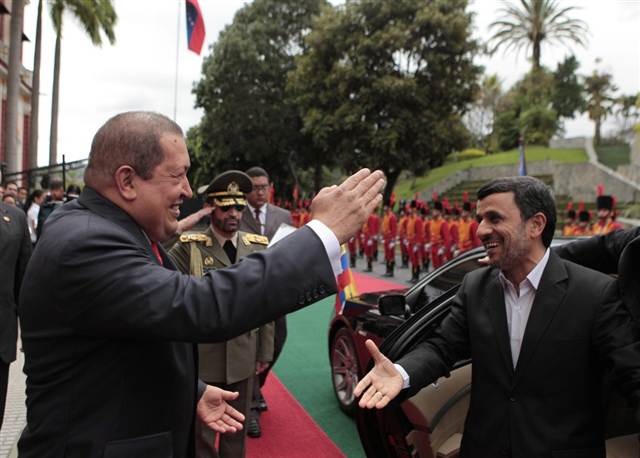Freedom Rider: Iran Fights Back
“The signs that Iran will be a new target for the U.S. are ominous and unmistakable,” but there are no indications that the Islamic Republic will break under superpower pressure. Instead, the Iranian president is visiting with other heads of state on the U.S. hit list. Washington’s demonization machinery is at full throttle, yet the truth remains: “Iran continues to be inconvenient to the United States for the simple reason that it exists and asserts its rights as a sovereign nation.”
by BAR editor and senior columnist Margaret Kimberley
“The devils in Washington do go crazy whenever their will is thwarted.”
It is a good thing for people all over the world that Iran feels confident enough to threaten resistance to United States aggression. In the uni-polar world, that is to say one controlled by American interests, the only salvation for humanity is the ability and willingness of nations to push back against imperialism’s dictates.
The signs that Iran will be a new target for the U.S. are ominous and unmistakable. The propaganda campaign against it is growing, with constant and false claims that Iran is a danger to the world and on the verge of producing nuclear weapons.
Nevertheless, it would be a mistake to think that the United States will always have the last word. Iran is not a powerless nation, it isn’t Iraq or Libya and it is clearly stating that it will put up a fight if the threats become real. If the United States pressures the states of the European Union to impose an embargo on the importation of Iranian crude oil, Iran has said that it will block the Straits of Hormuz [5], bringing the transportation of all Persian gulf oil to a standstill.
Most Americans are frightened by such talk, having given credence to every utterance from their government. Instead of being fearful, they ought to be happy. The only way that the United States will give up its aggression is if it knows that a price will be paid for its actions.
Barack Obama has already shown that he will go where even his Republican predecessors would not, so it is naïve to think that he wouldn’t attack Iran because George W. Bush didn’t. Reagan eventually demurred from toppling Muammar Gaddafi, but Obama carried out that item on the right wing wish list.
“The only way that the United States will give up its aggression is if it knows that a price will be paid for its actions.”
Iran continues to be inconvenient to the United States for the simple reason that it exists and asserts its rights as a sovereign nation. President Mahmoud Ahmadinejad doesn’t believe in being quiet. On the contrary, he does not pass up opportunities to very publicly stick a finger in Uncle Sam’s eye.
He is currently on a trip to Latin America, stopping in Venezuela, Ecuador, Nicaragua and Cuba. Venezuelan president Hugo Chavez put the matter very succinctly [6]. “One of the targets that Yankee imperialism has in its sights is Iran, which is why we are showing our solidarity. When we meet, the devils go crazy.”
While media depictions of the meeting claimed that Ahmadinejad’s trip is one of desperation and made light of the two leaders, a meeting between the two is significant. Venezuela is also a major oil producer, and if the two countries are cooperating, it can’t be good for the United States government or its plans to continue controlling the world economy with the dollar.
Most ominously for the United States, Iran and nations like Russia are reportedly making good on threats to drop the dollar and instead use their own currencies [7] in reciprocal trade exchanges. This is America’s true fear, that it will become irrelevant to the rest of the world.
Talk of nuclear threats and lies about “wiping Israel off the map” are but a pretext. The United States doesn’t want any competition in the world, and countries that refuse to knuckle under to their demands are declared enemies and marked for destruction.
“There is nothing like expensive gasoline to make even apathetic and uninformed Americans sit up and pay attention.”
Chavez is right. The devils in Washington do go crazy whenever their will is thwarted. Most Americans go crazy too, because of the steady diet of propaganda fed to them. Libya went from goat to hero to goat again, and the public followed the inexplicable assessments without batting an eye, remaining ignorant of their leaders’ true motivations because a supposed enemy was demonized well enough.
That may not matter either if the Obama administration takes actions that strike at the heart of the world economy. There is nothing like expensive gasoline to make even apathetic and uninformed Americans sit up and pay attention.
Every new American appeal for sanctions or embargoes against Iran may bring the world closer to a series of disasters, and they may also bring the United States closer to a much needed defeat. George W. Bush said to the Iraqi resistance, “Bring it on,” and the end result was that he agreed to leave that country.
Anyone who wants a peaceful and just world cringes when Obama spreads American violence across the globe, but the outcome of these actions ultimately cannot be good for the United States. The day of reckoning, a comeuppance, is near, and Iran may well be the nation that dispenses it. The devils may go crazy as Chavez said, but they can’t work their will forever.
Margaret Kimberley’s Freedom Rider column appears weekly in BAR, and is widely reprinted elsewhere. She maintains a frequently updated blog as well as at http://freedomrider.blogspot.com. [8]Ms. Kimberley lives in New York City, and can be reached via e-Mail at Margaret.Kimberley(at)BlackAgandaReport.com.
 _______________________________________________________________________________
_______________________________________________________________________________
¶
ADVERT PRO NOBIS
IF YOU CAN’T SEND A DONATION, NO MATTER HOW SMALL, AND YOU THINK THIS PUBLICATION IS WORTH SUPPORTING, AT LEAST HELP THE GREANVILLE POST EXPAND ITS INFLUENCE BY MENTIONING IT TO YOUR FRIENDS VIA TWEET OR OTHER SOCIAL NETWORKS!
We are in a battle of communications with entrenched enemies that won’t stop until this world is destroyed and our remaining democratic rights stamped out. Only mass education and mobilization can stop this process.
It’s really up to you.
Do your part while you can.
•••
Donating? Use PayPal via the button below.
THANK YOU.
____________________________________________________________________________________________________











